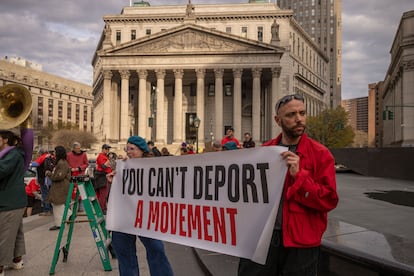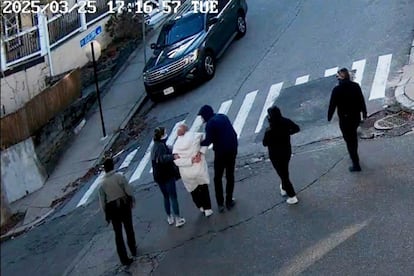Why the Trump administration is revoking student visas
Students and immigration lawyers say cancellations have often occurred without notice, interviews or clear justification

In recent weeks, the Trump administration has abruptly revoked visas for hundreds of international students from across the United States, triggering a wave of confusion, legal challenges and growing fear on college campuses. While U.S. officials have cited national security concerns and violations of immigration laws, many students and advocacy groups say the revocations are being carried out without due process and appear to disproportionately target those involved in political activism, especially pro-Palestine protests.
According to the State Department, at least 300 visas have been revoked, a number that may be even higher as more reports emerge. Universities such as Harvard, Columbia, Stanford, the University of California or Ohio State University have reported that students and recent graduates have lost their legal residency without notice. In several cases, students have been detained by Immigration and Customs Enforcement (ICE), sometimes by agents in civilian clothes near their homes or campuses.
Why are student visas being revoked?
Students and immigration attorneys claim that the visa revocations have largely occurred without advance notice, interviews or clear justification. Some revocations appear to be related to minor infractions, such as speeding tickets or the dropping of criminal charges, while others appear to be based solely on students’ participation in protests or political speeches, particularly those who have shown support for Palestine, and who are against Israel’s war actions in Gaza.

Legal experts point out that international students on F-1 visas enjoy First Amendment protection, just like U.S. citizens. However, because their visas are temporary, any perceived violation — even vague or unfounded — can lead to their removal from the country.
In many cases, revocations have been termed “prudential,” meaning they are based on suspicion rather than proven violations. Under immigration law, a visa can be revoked if the holder is deemed inadmissible on security, medical, financial or criminal grounds; if he or she is ineligible for the visa category; or if any information emerges that may present a future risk.
However, critics argue that the Trump administration is using this authority to effectively carry out mass removals of students who have not been charged with any crime. The American Civil Liberties Union (ACLU) has called it an unconstitutional ideological test.
Legal challenges
Students from states such as New Hampshire, California and Georgia have filed lawsuits against the Department of Homeland Security, alleging that their legal rights have been violated. One case that has attracted national attention is that of Xiaotian Liu, a Chinese doctoral student at Dartmouth College. Liu’s visa was cancelled without explanation, and he has not been charged with any crime or misconduct.
Similarly, Mahmoud Khalil, a legal permanent resident and recent graduate of Columbia University, was arrested at his home in March. His lawyers allege that the arrest was politically motivated and related to his activism on Palestinian issues. Rumeysa Ozturk, a student at Tufts University, was detained by six ICE agents on her way to a Ramadan event, despite having no criminal record.

Revocation process and precedents
Revoking a visa usually requires an interview at a U.S. consulate and an explanation of the reasons for the action. In practice, however, the process is often opaque. The State Department may notify the visa holder of the revocation by email or, as is increasingly common, not notify the visa holder at all, merely entering the revocation into government systems. If a student is already in the United States, his or her status may technically remain valid unless an immigration judge rules otherwise. However, their ability to travel, change status, or remain in the country becomes uncertain.
Historically, student visa revocations have been infrequent and linked to specific, verifiable reasons. The scale and apparent political targeting of the current wave has drawn comparisons to the Trump-era “Muslim Ban,” which led to more than 60,000 visa cancellations.
The uncertainty could severely impact the U.S. higher education system, as it could lose a generation of global talent if foreign students no longer feel safe traveling to the United States.
Responses from institutions
Universities are rushing to provide legal assistance and reassurance to their international students. Many urge students to carry immigration documents at all times and seek clarification from federal agencies.
Sign up for our weekly newsletter to get more English-language news coverage from EL PAÍS USA Edition
Tu suscripción se está usando en otro dispositivo
¿Quieres añadir otro usuario a tu suscripción?
Si continúas leyendo en este dispositivo, no se podrá leer en el otro.
FlechaTu suscripción se está usando en otro dispositivo y solo puedes acceder a EL PAÍS desde un dispositivo a la vez.
Si quieres compartir tu cuenta, cambia tu suscripción a la modalidad Premium, así podrás añadir otro usuario. Cada uno accederá con su propia cuenta de email, lo que os permitirá personalizar vuestra experiencia en EL PAÍS.
¿Tienes una suscripción de empresa? Accede aquí para contratar más cuentas.
En el caso de no saber quién está usando tu cuenta, te recomendamos cambiar tu contraseña aquí.
Si decides continuar compartiendo tu cuenta, este mensaje se mostrará en tu dispositivo y en el de la otra persona que está usando tu cuenta de forma indefinida, afectando a tu experiencia de lectura. Puedes consultar aquí los términos y condiciones de la suscripción digital.









































